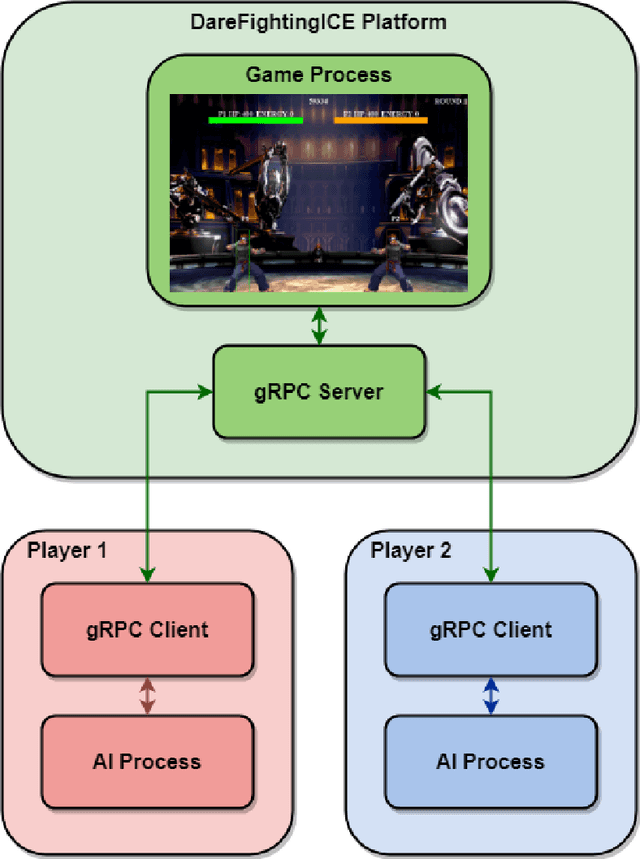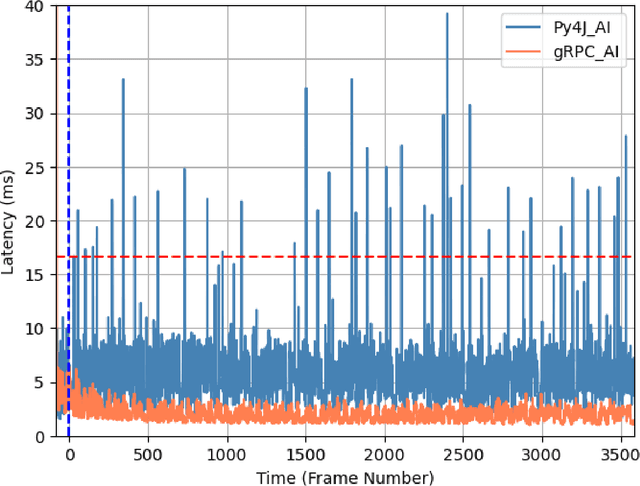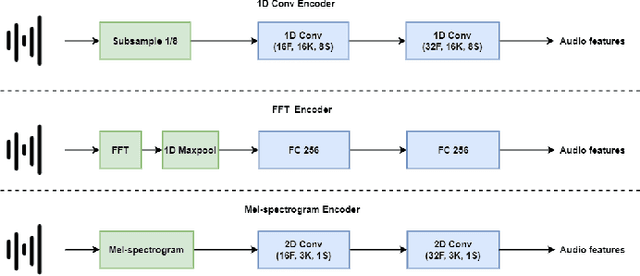Ibrahim Khan
Enhanced DareFightingICE Competitions: Sound Design and AI Competitions
Mar 05, 2024



Abstract:This paper presents a new and improved DareFightingICE platform, a fighting game platform with a focus on visually impaired players (VIPs), in the Unity game engine. It also introduces the separation of the DareFightingICE Competition into two standalone competitions called DareFightingICE Sound Design Competition and DareFightingICE AI Competition--at the 2024 IEEE Conference on Games (CoG)--in which a new platform will be used. This new platform is an enhanced version of the old DareFightingICE platform, having a better audio system to convey 3D sound and a better way to send audio data to AI agents. With this enhancement and by utilizing Unity, the new DareFightingICE platform is more accessible in terms of adding new features for VIPs and future audio research. This paper also improves the evaluation method for evaluating sound designs in the Sound Design Competition which will ensure a better sound design for VIPs as this competition continues to run at future CoG. To the best of our knowledge, both of our competitions are first of their kind, and the connection between the competitions to mutually improve the entries' quality with time makes these competitions an important part of representing an often overlooked segment within the broader gaming community, VIPs.
Fighting Game Adaptive Background Music for Improved Gameplay
Mar 05, 2024

Abstract:This paper presents our work to enhance the background music (BGM) in DareFightingICE by adding adaptive features. The adaptive BGM consists of three different categories of instruments playing the BGM of the winner sound design from the 2022 DareFightingICE Competition. The BGM adapts by changing the volume of each category of instruments. Each category is connected to a different element of the game. We then run experiments to evaluate the adaptive BGM by using a deep reinforcement learning AI agent that only uses audio as input (Blind DL AI). The results show that the performance of the Blind DL AI improves while playing with the adaptive BGM as compared to playing without the adaptive BGM.
Achieving Fairness in DareFightingICE Agents Evaluation Through a Delay Mechanism
Dec 26, 2023


Abstract:This paper proposes a delay mechanism to mitigate the impact of latency differences in the gRPC framework--a high-performance, open-source universal remote procedure call (RPC) framework--between different programming languages on the performance of agents in DareFightingICE, a fighting game research platform. The study finds that gRPC latency differences between Java and Python can significantly impact real-time decision-making. Without a delay mechanism, Java-based agents outperform Python-based ones due to lower gRPC latency on the Java platform. However, with the proposed delay mechanism, both Java-based and Python-based agents exhibit similar performance, leading to a fair comparison between agents developed using different programming languages. Thus, this work underscores the crucial importance of considering gRPC latency when developing and evaluating agents in DareFightingICE, and the insights gained could potentially extend to other gRPC-based applications.
Adaptive Background Music for a Fighting Game: A Multi-Instrument Volume Modulation Approach
Mar 28, 2023Abstract:This paper presents our work to enhance the background music (BGM) in DareFightingICE by adding an adaptive BGM. The adaptive BGM consists of five different instruments playing a classical music piece called "Air on G-String." The BGM adapts by changing the volume of the instruments. Each instrument is connected to a different element of the game. We then run experiments to evaluate the adaptive BGM by using a deep reinforcement learning AI that only uses audio as input (Blind DL AI). The results show that the performance of the Blind DL AI improves while playing with the adaptive BGM as compared to playing without the adaptive BGM.
Improving Data Transfer Efficiency for AIs in the DareFightingICE using gRPC
Mar 11, 2023



Abstract:This paper presents a new communication interface for the DareFightingICE platform, a Java-based fighting game focused on implementing AI for controlling a non-player character. The interface uses an open-source remote procedure call, gRPC to improve the efficiency of data transfer between the game and the AI, reducing the time spent on receiving information from the game server. This is important because the main challenge of implementing AI in a fighting game is the need for the AI to select an action to perform within a short response time. The DareFightingICE platform has been integrated with Py4J, allowing developers to create AIs using Python. However, Py4J is less efficient at handling large amounts of data, resulting in excessive latency. In contrast, gRPC is well-suited for transmitting large amounts of data. To evaluate the effectiveness of the new communication interface, we conducted an experiment comparing the latency of gRPC and Py4J, using a rule-based AI that sends a kick command regardless of the information received from the game server. The experiment results showed not only a 65\% reduction in latency but also improved stability and eliminated missed frames compared to the current interface.
A Deep Reinforcement Learning Blind AI in DareFightingICE
May 16, 2022



Abstract:This paper presents a deep reinforcement learning AI that uses sound as the input on the DareFightingICE platform at the DareFightingICE Competition in IEEE CoG 2022. In this work, an AI that only uses sound as the input is called blind AI. While state-of-the-art AIs rely mostly on visual or structured observations provided by their environments, learning to play games from only sound is still new and thus challenging. We propose different approaches to process audio data and use the Proximal Policy Optimization algorithm for our blind AI. We also propose to use our blind AI in evaluation of sound designs submitted to the competition and define three metrics for this task. The experimental results show the effectiveness of not only our blind AI but also the proposed three metrics.
DareFightingICE Competition: A Fighting Game Sound Design and AI Competition
Mar 03, 2022



Abstract:This paper presents a new competition -- at the 2022 IEEE Conference on Games (CoG) -- called DareFightingICE Competition. The competition has two tracks: a sound design track and an AI track. The game platform for this competition is also called DareFightingICE, a fighting game platform. DareFightingICE is a sound-design-enhanced version of FightingICE, used earlier in a competition at CoG until 2021 to promote artificial intelligence (AI) research in fighting games. In the sound design track, participants compete for the best sound design, given the default sound design of DareFightingICE as a sample. Participants of the AI track are asked to develop their AI algorithm that controls a character given only sound as the input (blind AI) to fight against their opponent; a sample deep-learning blind AI will be provided by us. Our means to maximize the synergy between the two tracks are also described. This competition serves to come up with effective sound designs for visually impaired players, a group in the gaming community which has been mostly ignored. To the best of our knowledge, DareFightingICE Competition is the first of its kind within and outside of CoG.
 Add to Chrome
Add to Chrome Add to Firefox
Add to Firefox Add to Edge
Add to Edge